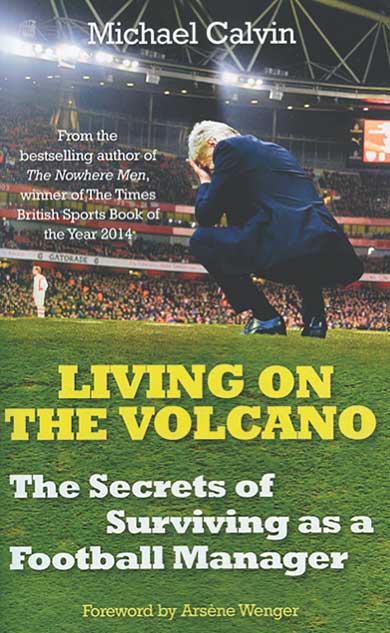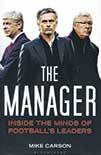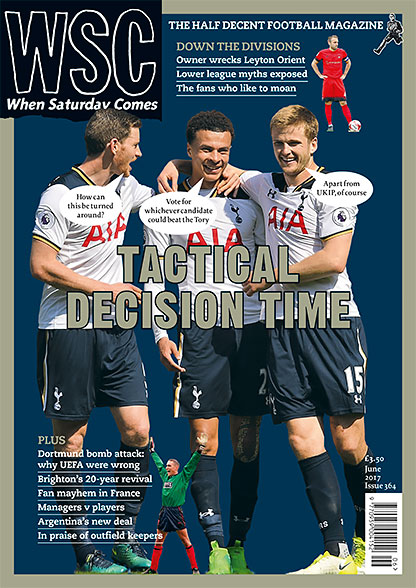Search: 'League Managers Association'
Stories
Warburton wanted to use Rangers as a stepping stone but the confusion surrounding his exit does not mask the inadequate job he did for the club
 The secrets of surviving as a football manager
The secrets of surviving as a football manager
by Michael Calvin
Century Books, £16.99
Reviewed by Huw Richards
From WSC 344 October 2015
Football uses managers as defining figures much as old-style history employed monarchs, to the extent of describing often pathetically short periods in office as “reigns”. Michael Calvin’s labelling of this phenomenon “Gaffer as Godhead” typifies an eye for the neat, aphoristic turn of phrase. He sees Roberto Martínez as “an undercover pragmatist” and identifies Ian Holloway as a “man of contradiction and impulse”. Such one-liners stud a book built on long interviews with its subjects, among which Holloway’s stream of consciousness stands out along with a sympathetic account of Alan Irvine’s travails and an intriguing portrait of Paul Tisdale.
Anyone wanting the long view of football management still needs to read Neil Carter’s historical study (The Football Manager, published in 2006). But as a picture of how it is now, this will be hard to beat. Those seeking the “how to” guide implied in the subtitle will find plenty of ideas, but must look hard since they are located within the wealth of insight and anecdote throughout the interviews rather than any grand overarching exposition. “Survival” implies retaining health, sanity and self-respect, rather than avoiding the all-but inevitable sack, although on either count your chances are better at Swansea, Exeter or Everton than QPR or Leeds.
This is a job which demands unshakeable self-confidence, but at the same time is designed to erode and ultimately destroy it. The toll it can take is shown at its most extreme by Martin Ling’s description of depression and electro-convulsive therapy, but there is plenty of testimony elsewhere, such as Brian McDermott’s belief that: “There are a lot of depressed people in football, but they probably do not even know it, because they are conditioned by the game.”
Calvin’s questioning evokes a sense of men who are confident and reflective, with credentials and hinterlands beyond their coaching badges. Some, such as Brendan Rodgers, are adepts in neuro-linguistic programming (no, me neither before I read this book), while Chris Hughton did a corporate management course and many have benefited from the League Managers Association’s training.
Aidy Boothroyd may still periodically punch a wall at half time, but sensitivity has replaced rage as a default setting. It is not just innate decency that explains Eddie Howe’s practice of “being a shoulder” for players, but that it “can only help you”.
They are also supportive of each other. Rodgers and Alan Pardew in particular emerge as willing to assist others, while Pardew also generates the best piece of trivia with his pride, from his past as a glazier, at having installed windows on the Natwest Tower and Sea Containers House.
Calvin is no soft touch, but the overwhelming impression he conveys is a sympathetic one – of largely decent, if driven men working in a world where, as Mick McCarthy says, “common sense is not very common”. The problem is not the managers, but the people who appoint them and the hysterical atmosphere in which they must try to function.
 My story
My story
by Alan Buckley with Paul Thundercliffe
Matador, £18.99
Reviewed by Tom Lines
From WSC 325 March 2014
Alan Buckley sits just above Matt Busby in the League Managers Association’s Hall of Fame. Admittedly the list is organised alphabetically (it recognises the 18 managers who have taken charge of over 1,000 games in England) but Buckley’s story is certainly worthy of closer examination. Not simply because of his record – he took Third Division Walsall to a League Cup semi-final against Liverpool and achieved back-to-back promotions at Grimsby – but the manner in which his teams played. Buckley was a sort of anti-John Beck, achieving success at unfashionable clubs on shoestring budgets by playing an unusually attractive brand of passing football.
From his early days as an apprentice at Nottingham Forest it is clear that Buckley has one eye on his long-term future and he recounts the bafflement of Forest’s coaching staff when, at the age of 16, he casually announces that he has enrolled on an FA coaching course.Unable to establish himself at the City Ground, Buckley made his name as a prolific lower-league striker at Walsall, scoring over 20 goals in five consecutive seasons and earning a move to the First Division with Birmingham City in 1978. Persuaded to return to Fellows Park the following year, he became player-manager aged just 28, embarking on a 30-year career in management that included successful spells at Walsall and Grimsby as well as unhappier times at West Brom (his one shot at managing a “big” club), Lincoln and Rochdale.
Buckley is, by his own admission, an awkward character. Spiky, quick to anger and with little interest in what he dismisses as “the PR side of football” he spends a fair bit of time here recalling his bad behaviour and then apologising to those who were on the receiving end.
Many of the book’s best moments involve the late Walsall chairman Ken Wheldon. A scrap metal dealer by trade, Wheldon has a mysterious padlocked phone in his office and is described as looking “exactly like Poirot”, something confirmed by the inclusion of a photograph of him standing next to a man dressed as Elton John. The fact that, on closer inspection, it actually is Elton John reminds you what a reassuringly strange place football was in the 1980s. When Dave Mackay is linked with the Walsall job, Buckley demands to know whether there is any truth in the rumour. Wheldon spends half an hour rubbishing the stories and, suitably reassured, Buckley leaves his office – only to pass Mackay sitting in reception.
Buckley’s time at Grimsby is more successful on the pitch but not as entertaining off it and the closing chapters are the most personal; his career enters a flat spin and he writes eloquently about the turmoil of being unable to turn around a failing team. For his longevity Buckley deserves his place in managerial history. But it’s his dogged commitment to playing “the right way” that marks him out as one of the game’s more intriguing characters.
 Inside the minds of football’s leaders
Inside the minds of football’s leaders
by Mike Carson
Bloomsbury in association with the League Managers Association, £16.99
Reviewed by Barney Ronay
From WSC 321 November 2013
Often when reviewing a book it is customary to quote one of the best bits at the start to give a little flavour of what treats can be found within its pages. This isn’t an easy thing to do with The Manager. Mainly because there aren’t any best bits, or even any good bits to speak of – apart from occasional unintentionally good bits, such as the passage that starts off by quoting St Francis of Assisi and Stephen Covey “best-selling author of The Seven Habits Of Highly Effective People” (me neither) before ploughing into a passage on the philosophy of Neil Warnock (yes that one).
On the other hand despite its lack of good bits, its muscular banality – the literary equivalent of a long and tedious game of squash – The Manager is also a considerable achievement in its own right. Most notably it takes one of the more mercurial and thrillingly baroque aspects of English football and turns it into something so unrelentingly laborious that this book, which is sponsored by the League Managers Association and the Premier League, should come with a warning not to operate heavy machinery or drive late at night should you accidentally find yourself reading more than a paragraph or two.
Yet this is perhaps a little unfair. In reality The Manager is barely a book at all, more a kind of how-to guide aimed not at football fans but at business-minded people: leaders, rain-makers, ladder-climbers, even football managers themselves. This lumping together of football and corporate managerdom is a process that has been in train for some time, but it is given a fresh twist here. The first secretary-mangers would often borrow the mannerisms and vocabulary of clerks or factory foremen.
In the 1950s a socially mobile breed of manager took up the coat and hat of the ambitious junior sales manager. The 1980s brought with them a breed of Thatcherite manager-made-good, the Big Ron-ish notion of the manager as self-made man and flash git. With the celebrification of the modern manager – and with football generally bleeding into every other walk of life – this is now a process that has increasingly been reversed. The corporate world looks to football, borrowing the manager’s habits, mannerisms and – as here – musings on success, the leadership of men and the rest of it.
Perhaps for this reason the book seems to describe an unfamiliar footballing world. In part this is because it presents a version of football completely robbed of any humour, becoming in the process at times quite funny – favourite chapter heading: “Seeing The Bigger Picture (Harry Redknapp)” – and in part this is because it is simply very dull.
Poring over the cracker motto banalities (“if there is a lesson to take from this it is the tendency of great leaders to take ownership of their situations. In the words of Mick McCarthy…”) it is tempting to conclude that the real problem with The Manager is managers themselves. When they talk about football English managers just aren’t very interesting. Instead they are famously dull, anti-academic and light on any coherent management theory. Particularly when, as here, what they have to say is presented unquestioningly, without context, irony, analysis or any of the things most people who like football like about football.
